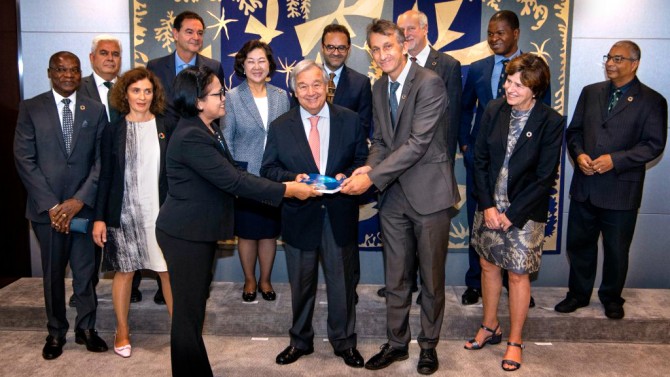Professor delivers sustainability report to UN secretary-general
By Blaine Friedlander
The first quadrennial report of the United Nations’ Global Sustainable Development Goals – prepared by a small group of independent scientists, including Cornell’s Parfait M. Eloundou-Enyegue – was released and delivered Sept. 10 in New York to U.N. Secretary-General António Guterres.
This report supplements annual reviews done internally at the U.N. by giving an independent and broad-based assessment of the current trends in global development and to review how the world can chart a better future.
Guterres will present the 250-page report – titled “The Future is Now: Science to Achieve Sustainable Development” – to the U.N.’s member states at the upcoming General Assembly on Sept. 24-25.
The U.N.’s Sustainable Development agenda is built around 17 global goals to reach by 2030. These actions include remediating climate change; making sustainable cities and communities stronger; advancing clean water, clean energy, quality education and gender equality; and reducing hunger and poverty to zero.
Today the progress in reaching these goals is mixed, said Eloundou-Enyegue, chair of the Department of Development Sociology and associate director of the Cornell Population Center.
“The world has made remarkable progress, for instance, in reducing child mortality,” he said. “At the same time, there has been limited progress in other areas and in some instances the world is trending in a negative direction, such as with climate change, the loss of biodiversity and growing inequality – especially within countries.”
Environmental and societal statistics remain grim. Currently, about 2 billion people experience food insecurity, 820 million people are undernourished and nearly 2 billion people are overweight, according to the report.
For energy, around the world, about 1 billion people still cannot access electricity and more than 3 billion people rely on polluting solid fuels for cooking. In developed countries, growth in the green energy economy has been hampered by fossil fuel subsidies that distract from their actual economic, health and environmental costs, said the report’s committee members.
The report noted that achieving global sustainability goals requires separating economic growth from environmental degradation; reducing social and gender inequalities in wealth and income; and promoting more access to opportunities.
Cornell played a role in one of the report’s key messages.
In May 2018, the university’s Polson Institute hosted a conference, “Bridging Science and Policy in the Sustainable Development Era,” in Ithaca. At the conference, global experts from organizations including the Bill & Melinda Gates Foundation, USAID and UNESCO gathered to inform the report’s science and technology section.
“The world needs a better interface between science and policymaking,” said Eloundou-Enyegue, a fellow at Cornell’s Atkinson Center for a Sustainable Future. “This can make a difference in solving the many problems we face in terms of hunger, education and environment. If we can have a fluid and effective interface between the worlds of science and policymaking, it becomes easier to identify urgent problems and react in real time.”
In the foreword of the new report, Guterres reminded readers: “Science is our great ally in the efforts to achieve the goals. [This] report presents an objective assessment of where we are falling short and what needs to be done. This report reminds us that the future is determined by what we do now and the window of opportunity is closing fast.”
Media Contact
Get Cornell news delivered right to your inbox.
Subscribe

